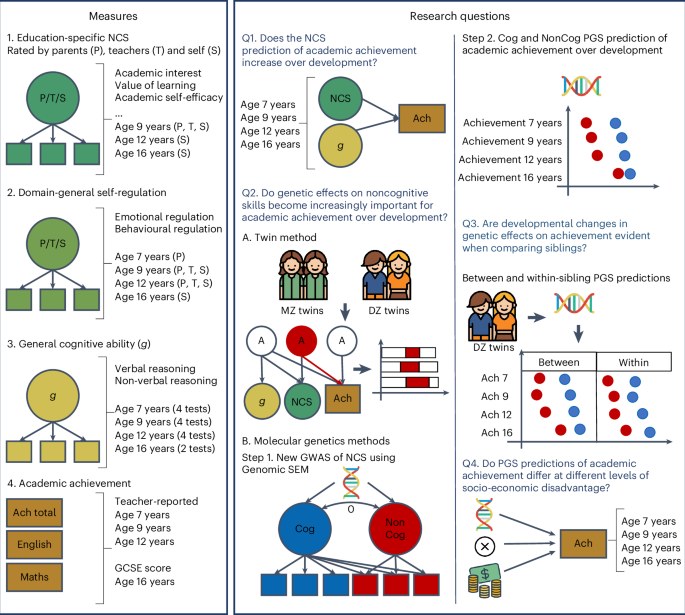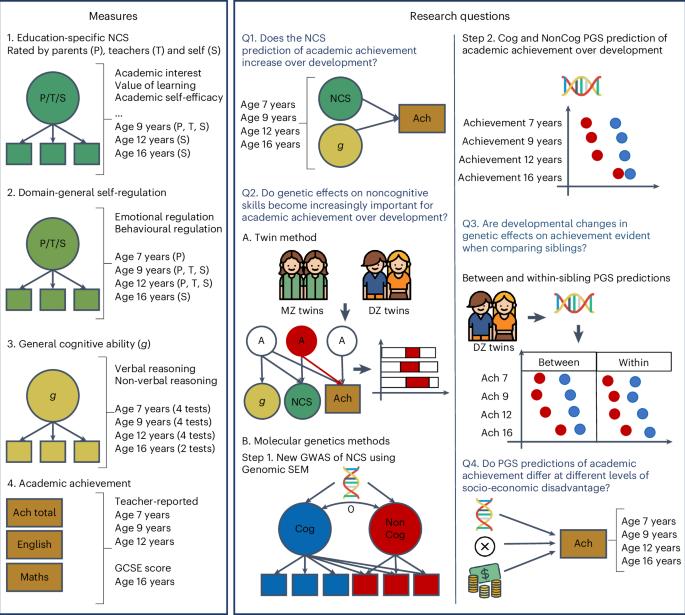Genetic associations between non-cognitive skills and academic achievement over development
IF 21.4
1区 心理学
Q1 MULTIDISCIPLINARY SCIENCES
引用次数: 0
Abstract
Non-cognitive skills, such as motivation and self-regulation, are partly heritable and predict academic achievement beyond cognitive skills. However, how the relationship between non-cognitive skills and academic achievement changes over development is unclear. The current study examined how cognitive and non-cognitive skills are associated with academic achievement from ages 7 to 16 years in a sample of over 10,000 children from England and Wales. The results showed that the association between non-cognitive skills and academic achievement increased across development. Twin and polygenic scores analyses found that the links between non-cognitive genetics and academic achievement became stronger over the school years. The results from within-family analyses indicated that non-cognitive genetic effects on academic achievement could not simply be attributed to confounding by environmental differences between nuclear families, consistent with a possible role for evocative/active gene–environment correlations. By studying genetic associations through a developmental lens, we provide further insights into the role of non-cognitive skills in academic development. Malanchini et al. find that non-cognitive skills increasingly predict academic achievement over development, driven by shared genetic factors whose influence grows over school years. These effects persist across socio-economic contexts and suggest the importance of fostering non-cognitive skills in education.


非认知技能与学业成绩在成长过程中的遗传关联。
非认知技能,如动机和自我调节,具有部分遗传性,可预测认知技能之外的学业成绩。然而,非认知技能与学业成绩之间的关系如何随着发展而变化尚不清楚。本研究以英格兰和威尔士的 10,000 多名儿童为样本,研究了认知和非认知技能与 7 至 16 岁学业成绩之间的关系。结果表明,非认知技能与学业成绩之间的关联在整个成长过程中都在增加。孪生子和多基因分数分析发现,非认知遗传与学业成绩之间的联系在学龄期间变得更加紧密。家庭内部分析的结果表明,非认知遗传对学业成绩的影响不能简单地归因于核心家庭之间环境差异的干扰,这与诱发/主动基因-环境相关性可能发挥的作用是一致的。通过从发展的角度研究遗传关联,我们进一步了解了非认知技能在学业发展中的作用。
本文章由计算机程序翻译,如有差异,请以英文原文为准。
求助全文
约1分钟内获得全文
求助全文
来源期刊

Nature Human Behaviour
Psychology-Social Psychology
CiteScore
36.80
自引率
1.00%
发文量
227
期刊介绍:
Nature Human Behaviour is a journal that focuses on publishing research of outstanding significance into any aspect of human behavior.The research can cover various areas such as psychological, biological, and social bases of human behavior.It also includes the study of origins, development, and disorders related to human behavior.The primary aim of the journal is to increase the visibility of research in the field and enhance its societal reach and impact.
 求助内容:
求助内容: 应助结果提醒方式:
应助结果提醒方式:


